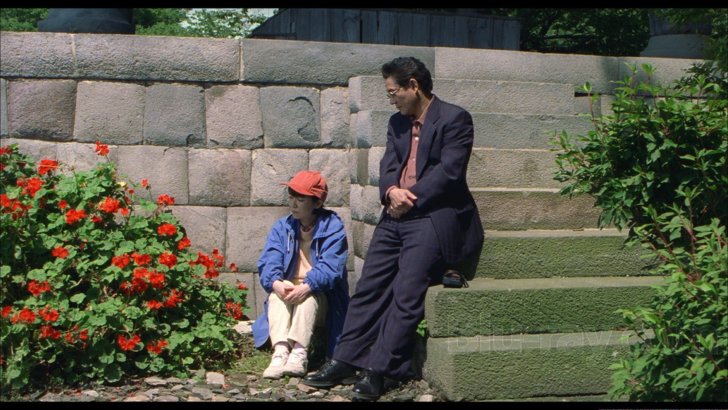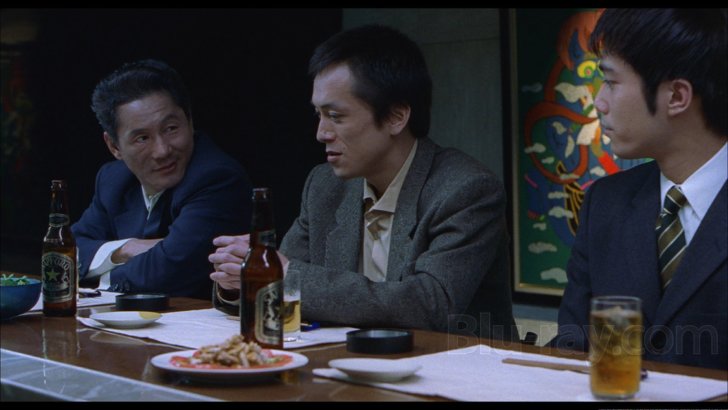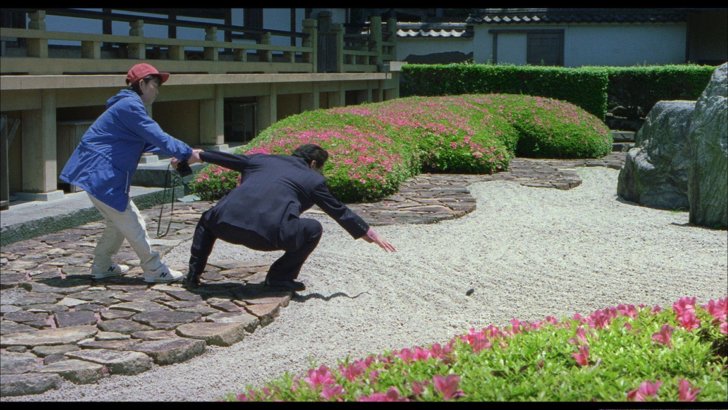Hana-Bi Blu-ray Movie
HomeHana-Bi Blu-ray Movie 
Fireworks / はなびFilm Movement | 1997 | 103 min | Not rated | Sep 19, 2017
Movie rating
8.1 | / 10 |
Blu-ray rating
| Users | 0.0 | |
| Reviewer | 4.0 | |
| Overall | 4.0 |
Overview
Hana-Bi (1997)
A hard-boiled ex-cop, haunted by a troubled past and pushed to the edge by the shooting of his partner, confronts his demons in a ruthless quest for justice and redemption.
Starring: Takeshi Kitano, Kayoko Kishimoto, Ren Ôsugi, Susumu Terajima, Tetsu WatanabeDirector: Takeshi Kitano
| Foreign | Uncertain |
| Drama | Uncertain |
| Crime | Uncertain |
| Romance | Uncertain |
| Thriller | Uncertain |
Specifications
Video
Video codec: MPEG-4 AVC
Video resolution: 1080p
Aspect ratio: 1.85:1
Original aspect ratio: 1.85:1
Audio
Japanese: LPCM 2.0 (48kHz, 24-bit)
Subtitles
English
Discs
Blu-ray Disc
Single disc (1 BD)
Playback
Region free
Review
Rating summary
| Movie | 4.0 | |
| Video | 4.5 | |
| Audio | 4.5 | |
| Extras | 3.0 | |
| Overall | 4.0 |
Hana-Bi Blu-ray Movie Review
Reviewed by Dr. Svet Atanasov July 15, 2018Takeshi Kitano's "Hana-bi" a.k.a. "Fireworks" (1997) arrives on Blu-ray courtesy of Film Movement. The supplemental features on the disc include an audio commentary by critic David Fear; making of documentary feature; and trailers. The release also arrives with a 14-page illustrated booklet featuring an essay by writer and filmmaker Jasper Sharp. In Japanese, with optional English subtitles for the main feature. Region-Free.

Quiet time
Japanese superstar Takeshi Kitano plays a retired cop whose life has become a nightmare. Early in the film a few scattered flashbacks reveal why. In one of them Nishi leaves a stakeout to visit his wife (Kayoko Kishimoto, Kikujiro) in the hospital and one of his partners suffers a serious injury that leaves him paralyzed while another is killed. In a second flashback a doctor suggests that Nishi takes his wife back to their home because she is dying and there is nothing else he and his team can do to help her. A third flashback reveals that Nishi owes a large amount of money to some local gangsters and that they have started harassing him.
In a desperate attempt to ease his wife’s suffering, Nishi quietly robs a bank and then uses a portion of the money to take her on a road trip. For a while the pain seems to disappear and she looks truly happy. Nishi also sends some money to his paralyzed colleague and the wife of his dead colleague. He even pays the money he owes to the gangsters, but after they learn that he has robbed a bank they come back asking for more.
Hana-bi must have surprised a lot of Japanese viewers when it was released theatrically in 1997 because it reveals a very different side of Kitano’s creative personality. Here he plays a calm but unusually violent character who barely speaks, essentially the exact opposite of the bubbly and quite silly TV character that made him a big star in his home country. More importantly, Kitano looks incredibly comfortable with his ‘new’ personality, like a seasoned star who has had a long and very successful career playing diverse characters. (Prior to Hana-bi Kitano was one of the biggest comedians in Japan, but his theatrical work was not well received there. Also, the local critics accepted him as a legit director only after Hana-bi won the Golden Lion Award at the Venice Film Festival).
Despite the violence the film is very fluid and at times strikingly beautiful. When the camera comes close to Nishi and his dying wife one could easily feel the warmth in their relationship; it is authentic and incredibly moving. This is the reason why Nishi’s sporadic outbursts do not seem exaggerated. He is losing the love of his life and even though he is trying hard to suppress his anger occasionally it overwhelms him and he becomes unrecognizable.
Some of the most moving sequences feature long takes and beautiful panoramic shots which create the impression that one is viewing a collection of moving pictures. There are plenty of bright and lush colors but it is the thick blue and its rich nuances that essentially become the foundation for the film’s unique atmosphere.
The wonderful ambient soundtrack from Studio Ghibli composer Joe Hisaishi blends the many polarizing emotions. Beautiful and very gentle chamber pieces are impeccably timed with the visuals and make the film look unusually stylish.
Kitano shot Hana-bi with cinematographer Hideo Yamamoto. His credits also include such genre favorites as Ichi the Killer, The Happiness of the Katakuris, The Grudge, Audition, and Yatterman.
Hana-Bi Blu-ray Movie, Video Quality 

Presented in its original aspect ratio of 1.85:1, encoded with MPEG-4 AVC and granted a 1080p transfer, Takeshi Kitano's Hana-bi arrives on Blu-ray courtesy of Film Movement.
The release is sourced from the same remaster that Third Window Films worked with when they prepared the Region-B release of Haba-bi in the United Kingdom. Even though there is some room for minor improvements, I like it quite a lot. Detail and clarity are usually very good, while fluidity remains pleasing throughout the entire film. Depth is also very good, with the daylight footage in particular looking great (see screencapture #5). This being said, I feel that overall image balance could be slightly better. The gamma levels appear slightly elevated in select sequences and my guess is that ideally they should be adjusted during the encoding process. Also, there are a few sequences where highlights appear blown out a bit. Still, the overall quality of the remaster is very good. Here the encoding is also better and eliminates the obvious compression artifacts that are present on the Region-B release, though there is still room for minor adjustments. Image stability is outstanding. My score is 4.25/5.00. (Note: This is a Region-Free Blu-ray release. Therefore, you will be able to play it on your player regardless of your geographical location).
Hana-Bi Blu-ray Movie, Audio Quality 

There is only one standard audio track on this Blu-ray release: Japanese LPCM 2.0. Optional English subtitles are provided for the main feature.
If you previously owned Hana-bi on DVD and know what the quality of the lossy track was, I am quite certain that you will be quite impressed by the upgrade in quality that the lossess track offers. Indeed, there is a pretty substantial bump in quality in terms of depth and clarity. The music score benefits the most, but elsewhere even balance is noticeably superior. The English translation is excellent.
Hana-Bi Blu-ray Movie, Special Features and Extras 

- Commentary by David Fear - critic David Fear (Rolling Stone) offers plenty of very good observations about the visual style and ambience of Hana-bi and specifically how the relationship between visuals and music becomes an essential element of the narrative. Additionally, he discusses the evolution of Takeshi Kitano's image in Japan and his tense relationship with the local media as well as his transformation into an international star. Very good commentary.
- Making of Hana-bi - presented here is a collection of original Japanese trailers for early Takeshi Kitano films as well as footage from the shooting of Hana-bi. In Japanese, with optional English subtitles. (28 min, 1080p).
- Booklet - 14-page illustrated booklet featuring an essay by writer and filmmaker Jasper Sharp.
Hana-Bi Blu-ray Movie, Overall Score and Recommendation 

It should have happened earlier, but it was Hana-bi that legitimized Takeshi Kitano as a director in his home country. It is a very unusual film which at times feels like an exotic project Wim Wenders secretly shot in Japan years ago and then forgot about. I consider it one of Kitano's most touching films. Film Movement's release of Hana-bi is sourced from the recent remaster of the film and the technical presentation is a bit better than that of the Region-B release Third Window Films produced earlier. RECOMMENDED.
Similar titles
Similar titles you might also like

Violent Cop
その男、凶暴につき
1989

Boiling Point
1990

Drunken Angel
醉いどれ天使 / Yoidore tenshi
1948

Suburra
2015

Beyond Outrage
アウトレイジ ビヨンド / Outrage Beyond
2012

Outrage
アウトレイジ / Way of the Yakuza
2010

Drug War
毒戰
2012

Casque d'Or
Golden Marie
1952

Election
Hak se wui
2005

Dead or Alive
1999

Shinjuku Triad Society
1995

Le Samouraï 4K
1967

Le Cercle Rouge 4K
Uncut Version | includes remastered BD
1970

Infernal Affairs
無間道 / Mou gaan dou
2002

High and Low 4K
天国と地獄 / Tengoku to jigoku
1963

Ash Is Purest White
江湖儿女
2018

Stray Dog
野良犬 / Nora inu
1949

Détective
1985

Shanghai Triad
Yao a yao, yao dao wai po qiao / 摇啊摇,摇到外婆桥
1995

The Gangster, the Cop, the Devil
악인전 / Akinjeon
2019
